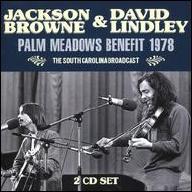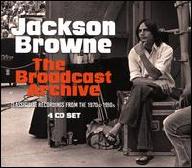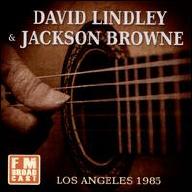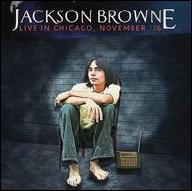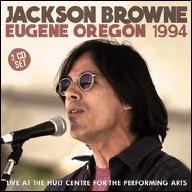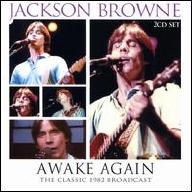Born in Heidelberg, West Germany, Jackson Browne and his family moved to Los Angeles when he was three years old, and by the time he was a teenager, Browne had developed an interest in folk music. He began playing guitar and writing songs, which he sang at local folk clubs. Early in 1966, he was invited to join the Nitty Gritty Dirt Band, whom he had met through the L.A. folk circuit. While he was only with the band for a few months, the group recorded a handful of his songs on its first two records. By the beginning of 1967, he had signed a publishing deal with Nina Music, a division of Elektra Records; Nina helped Browne secure songs on albums by Tom Rush and Steve Noonan in 1968. In 1967 and 1968, he lived in New York's Greenwich Village, where he played in Tim Buckley's backing band. Browne also began working with Nico, who recorded three of his songs on her Chelsea Girl album. When their relationship disintegrated in 1968, he returned to Los Angeles, where he unsuccessfully tried to record a solo album and form a folk group with Ned Doheney and Jack Wilce. Browne continued to play local clubs and his reputation as a songwriter continued to grow, with Linda Ronstadt and the Byrds recording his songs. By the end of 1971, he had signed with David Geffen's fledgling Asylum Records on the strength of his widely circulated demo tape.
Jackson Browne was released in the spring of 1972, spawning the Top Ten hit single "Doctor My Eyes." Shortly after "Doctor My Eyes" reached its peak position, "Take It Easy," a song Browne co-wrote with Glenn Frey, became the Eagles' breakthrough hit. Many songs from his debut, including "Rock Me on the Water" and "Jamaica Say You Will," became singer/songwriter standards, but the album itself didn't establish Browne as a pop star despite its hit single. On his second album, 1973's For Everyman, he began a long-term collaboration with instrumentalist David Lindley. For Everyman was a commercial disappointment, but it consolidated his cult following, and over the following decades it has gained a reputation as some of his best work. Released in the fall of 1974, Late for the Sky expanded Browne's audience significantly, peaking at number 14 on the charts and going gold by the beginning of the following year. Browne's first wife, Phyllis, committed suicide in the spring of 1976, but in the wake of the tragedy he recorded his commercial breakthrough album, The Pretender. The record climbed into the Top Ten upon its fall 1976 release, going platinum in the spring of 1977. In the summer, Browne launched an extensive tour, recording a new album while he was on the road. The result, Running on Empty (1977), was a bigger success than its predecessor, peaking at number three and launching the hit singles "Running on Empty" and "Stay/The Load-Out." With his career riding high, Browne began to pursue political and social causes, most notably protesting the use of nuclear energy.
The success of Hold Out, the 1980 follow-up to Running on Empty, was evidence of Jackson Browne's popularity. Though the album wasn't as well-crafted as its predecessors, it became his only number one album upon its release. In the summer of 1982, "Somebody's Baby," from the soundtrack of Fast Times at Ridgemont High, became Browne's biggest hit, climbing to number seven on the U.S. charts. Divided between love songs and political protests, Lawyers in Love was another hit due to success of the singles "Lawyers in Love," "Tender Is the Night," and "For a Rocker." Nevertheless, the album also showcased a newfound social consciousness that dominated 1986's Lives in the Balance. The album lacked any hit singles, yet its fiery condemnation of the Reagan era won an audience -- the album stayed on the charts for over six months and went gold.
Browne continued to write primarily political songs on 1989's World in Motion, and the record became his first album not to go gold. Browne was quiet for the next four years, working on a variety of social causes and suffering a painful public breakup with his girlfriend, actress Daryl Hannah. He finally returned with a comeback effort in the fall of 1993 titled I'm Alive. Comprised of more personal songs, I'm Alive received his best reviews since the late '70s and the record went gold without producing any major hits. In the spring of 1996, Browne released the similarly toned Looking East, which failed to gain the same attention as I'm Alive. 2002's The Naked Ride Home was followed two years later by the two-disc anthology The Very Best of Jackson Browne which coincided with Browne's induction into the Rock & Roll Hall of Fame by fellow Hall of Famer Bruce Springsteen. Embracing this retrospective phase, Browne took to the road and played a string of intimate acoustic shows around the globe. Live recordings compiled from these shows were later released as Solo Acoustic, Vol. 1 (2005) and Solo Acoustic, Vol. 2 (2008) on Browne's own Inside Recordings imprint. Also released in 2008 was Time the Conqueror, an album of new material that saw him mixing political and personal fare to great effect, earning Browne his first Top 20 chart placement since 1983.
Filling the gap between studio outings was 2010's Love Is Strange: En Vivo Con Tino, a Spanish concert album recorded with longtime collaborator David Lindley. Standing in the Breach, issued in October of 2014, was the first release of new studio material from Browne in six years and continued his trend of mixing political commentary with introspective songwriting. In honor of his decades of activism and charitable outreach, he received the Gandhi Peace Award from the American in 2021 with the poignant and pointed Downhill from Everywhere, his Grammy-nominated 15th studio album. ~ Stephen Thomas Erlewine, Rovi



